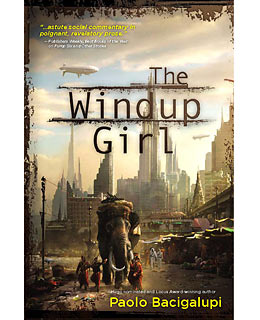
I picked up The Windup Girl by Paolo Bacigalupi solely on the strength of the blurb advertising it as having won both the Hugo and the Nebula for best novel. Not bad for a debut novel by a relatively unknown writer. It turned out to be a very pleasant surprise and I was particularly impressed by how deftly it portrays Southeast Asia. While I have misgivings about the plot and how events rush to an unsatisfying end, I still consider it to be one of the best novels I’ve read in recent years (not that I’ve been reading much admittedly).
Despite the title, the real star of the show here is arguably the city of Bangkok itself which is where the novel is set. In the 23rd century, the rising waters caused by global warming has destroyed many cities and even entire countries. With the world’s fossil fuels all but depleted, globalization as we now know it, is no more. The most powerful entities are the biotechnology companies who feed the world using their genehacked crops, maintaining their dominance by employing bio-engineered plagues to destroy natural food sources and even sending in private armies to topple governments when necessary.
Thailand is the last of Southeast Asian nations to survive and remain independent of the biotech companies. Its capital of Bangkok is now below sea level, but the city survives thanks to a vast network of levees and pumps that burn precious and hugely polluting coal to keep the ocean at bay. The kingdom’s most precious asset is an extensive seed bank of natural genetic stock which its geneticists draw on to keep one step ahead of the bio-engineered plagues and feed the population.
The story is told from the perspectives of a few different characters. Anderson Lake is nominally the farang owner of a kink-spring factory as mechanical energy has now replaced fossil fuels and springs have replaced batteries as the means to store that energy. However, he is secretly a calorie man, an executive from one of the hated agritech firms and his mission is to locate the secret Thai seed bank.
Lake’s factory manager and assistant is Tan Hock Seng, a Chinese refugee from Malaysia. It is revealed that when the world descended into chaos, the Muslims in Malaysia launched a pogrom against the ethnic Chinese. Hock Seng, once a successful shipping tycoon, was the only member of his family to survive the massacres and now lives in paranoia of it happening again. Competent and streetwise, he embezzles money from his employer in the hopes of one day becoming a trader again.
The windup girl of the novel’s title refers to Emiko, one of the New People, genetically engineered by the Japanese to bolster their depleted workforce. She once lived a life of luxury, serving her owner as a business secretary, translator and sexual companion, but was discarded and left to fend for herself in the streets of Bangkok when her owner found it cheaper to upgrade to a newer model. The term windup refers to the stutter-stop motion that has been designed into all her movements, so she can never blend in as a natural human.
Finally there is Jaydee Rojjanasukchai of the Environmental Ministry of Thailand. The ministry is charged with defending the kingdom from all manner of plagues and pests. They must be heartless enough to eradicate whole villages at a moment’s notice if a new disease is detected and clever enough to intercept the many ways that the biotech companies will use to try to sneak in their products. Once a champion Muay Thai fighter, Jaydee is known as the Tiger of Bangkok for his fearlessness in standing up to both the biotech companies as well as the powerful Trade Ministry, which wants a more accommodating policy.
All of these characters are embroiled in a conflict between the Environmental Ministry on one side and the Trade Ministry plus the calorie companies on the other. The conflict is low-key and subtle at first, but ratchets up in intensity and violence soon enough. It’s exciting stuff, but probably nothing you haven’t seen or read before. I also feel that the plot sort of loses its focus when the shooting starts and the ending is just a bit too rushed and pat.
The best thing about the book is still the richness and novelty of its setting. There are tons of convincing detail everywhere and Bacigalupi’s grasp of local color and flavor is nothing short of amazing. Malaysians will get a kick out of reading references to hainan chicken rice and bak kut teh. Apparently the writer majored in Asian studies and speaks Chinese fluently. But his mastery is not perfect. Depicting Hock Seng as a Malacca-based tycoon isn’t very convincing when it is little more than a tourist town today.
Regular readers of my blog will know that I’m no environmentalist, and while I do believe in global warming, I’m extremely skeptical of the apocalyptic future painted in this book. But that doesn’t stop me from enjoying what is a genuinely refreshing and entertaining read. While Bacigalupi is not yet at the standard of greats like William Gibson and Neal Stephenson as many critics have acclaimed, he certainly has the potential to be and I look forward to reading more of his work.
I really enjoyed it too. I find myself much more captured by good stories than the messages within them. The messages can be perfectly fine, but even if I don’t particularly agree with the messages that doesn’t detract from a good story. I did find the book to requite a bit more focus than I often have for reading – I often read when I am too tired to think too hard… Great read.
just got the book on my kindle.
Just finished unbroken by Laura Hillenbrand. It was great.